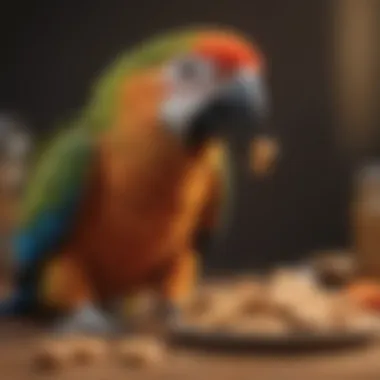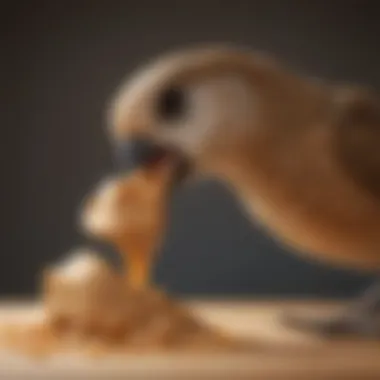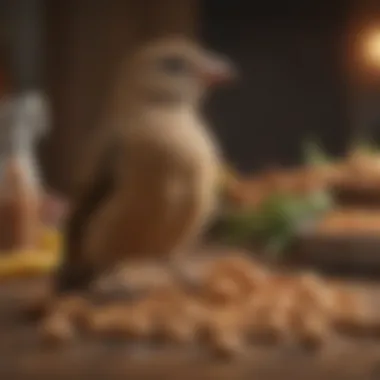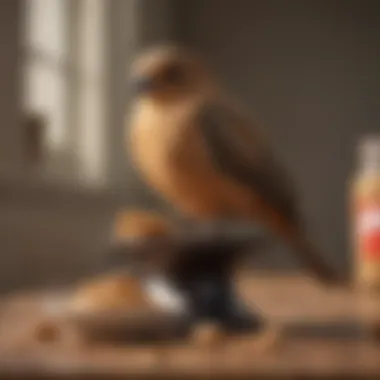Peanut Butter: A Safe Treat for Pet Birds?


Intro
Peanut butter can be an intriguing option in the diet of pet birds. For many bird owners, the challenge lies not only in the selection of appropriate foods but also in understanding the impact of human foods on avian health. This article aims to evaluate peanut butter as a dietary option, focusing on its nutritional value, potential hazards, and the best practices for introducing it to bird diets.
Pet birds come in a variety of species, each with distinct dietary requirements. From the seed-eating finch to the fruit-loving parrot, ensuring a balanced nutrition is paramount. Introducing human food, like peanut butter, raises questions about compatibility with existing diets and necessary precautions.
The goal is to furnish bird owners with factual information that allows for informed decisions regarding peanut butter as a dietary supplement or occasional treat. By understanding both the merits and risks associated with peanut butter, owners can better support the well-being of their avian companions.
Care Tips
Daily Care Routines
Ensuring a consistent daily care routine is vital. Feeding routine, exercise, and social interaction are key components. Monitor what your pet bird eats daily. If peanut butter is offered, provide it in moderation to avoid excessive caloric intake.
Cage Setup and Maintenance
Cage setup is pivotal for a bird’s health. Make sure the cage has adequate space for movement. Keep food and water dishes clean. If peanut butter is included in their diet, be aware that residues can accumulate.
Hygiene and Cleaning Practices
Maintaining hygiene in your bird's environment prevents sickness. Clean food and water containers regularly. If using peanut butter, ensure to clean any remnants to avoid spoilage or pest attraction.
Seasonal Care Adjustments
During colder months, adjust the diet to include higher energy foods. Peanut butter may be introduced during these times as it has higher fat content, providing the needed energy boost.
Behavioral Insights
Understanding Bird Body Language
Birds communicate primarily through body language. Be observant of changes. If introducing peanut butter, watch for any signs of distress or displeasure. A bird that appears to be avoiding food offerings may not appreciate the new addition to its diet.
Common Behavioral Issues and Solutions
Introducing new foods can sometimes lead to behavioral issues such as pickiness. If a bird refuses peanut butter, do not force it. Instead, mix it with its preferred foods gradually.
Positive Reinforcement Techniques
Use positive reinforcement for encouraging varied diets. For instance, if your bird tries peanut butter, offer verbal praise or a small treat. This encourages exploration of foods you wish to introduce.
Social Interaction Needs
Birds are social creatures. Ensure they have sufficient interaction. This helps in reducing stress and fosters a healthy relationship. Playtime can also serve as an opportunity to introduce new foods like peanut butter in a positive context.
Nutrition Guides
Essential Diet Components
A balanced diet for birds typically includes seeds, pellets, fruits, and vegetables. Peanut butter can complement this, but it should not replace core components.
Safe and Toxic Foods
Peanut butter is safe in small amounts. However, avoid additives such as sugar or salt. Certain foods like chocolate and avocado are toxic and must be avoided.
Supplements and Treats
Occasional treats are beneficial. Peanut butter can be a nutritional boost if given at the right intervals. Consider it more as a treat than a staple.
Feeding Strategies for Different Species
Understand the specific needs of the bird species you own. For example, larger birds like macaws may tolerate small amounts of peanut butter better than smaller species. Always research species-specific dietary needs first.
Wellness and Health
Routine Health Checkups
Regular checkups with a veterinarian ensure that your pet bird remains healthy. Discuss any new dietary changes with the vet, especially when introducing human foods.


Identifying Symptoms of Illness
Be aware of signs indicating something might be wrong. Loss of appetite or unusual behavior may signal health issues. If your bird shows such symptoms after eating peanut butter, cease offering it and consult a vet.
Preventative Care and Vaccinations
Maintaining vaccinations and preventative health measures will contribute to your bird's well-being. Discuss nutritional sources with your vet to ensure they do not interfere with vaccinations.
Mental and Emotional Well-being
Healthy diets also affect birds' mental health. A varied diet can contribute to cognitive stimulation. Peanut butter, when presented as a treat, can add excitement.
Enriching Activities
Toys and Playtime Ideas
Provide toys that stimulate intelligence. Toys can keep birds entertained and mentally engaged. Passing peanut butter through toys enhances playtime.
Training and Tricks
Training birds to do tricks can be rewarding. If using peanut butter as a reward, ensure it is unprocessed and safe for consumption.
Outdoor Activities and Interaction
Time outside in safe and monitored environments can be beneficial. This exposure helps to improve overall health. Be cautious about food availability when outdoors.
DIY Projects for Mental Stimulation
Consider creating DIY toys or puzzles that include peanut butter as part of the enrichment process. This fosters creativity and keeps the bird active.
Prelude to Avian Nutrition
Understanding avian nutrition is vital for all pet bird owners. The health and longevity of birds depend significantly on their diet. Just like any living being, birds require a balanced intake of nutrients to thrive. Proper nutrition helps in maintaining a healthy weight, fostering strong immune systems, and supporting optimal feather condition.
Birds have unique dietary needs that differ across species. A parakeet may not require the same nutrients as a macaw. Recognizing these differences is essential to creating a suitable diet. Bird owners must consider not only what is safe to feed but also what meets the specific nutritional requirements of their pets.
Introducing human foods like peanut butter can be a gray area. While some foods are harmless or even beneficial, others may pose risks. Understanding the fundamentals of avian nutrition aids in making informed decisions, ultimately enhancing the quality of life for feathered companions.
Understanding Dietary Needs
Birds are omnivorous, which means they eat a variety of foods. Their diet should include seeds, fruits, vegetables, grains, and, on occasion, protein sources. Different species have specific nutritional needs. For instance, large parrots often require more protein and fat compared to smaller birds.
A well-balanced diet often includes:
- Proteins: Vital for growth and tissue repair.
- Carbohydrates: Provide energy for daily activities.
- Fats: Essential for skin and feather health.
- Vitamins and Minerals: Necessary for various bodily functions.
When exploring dietary options, one must take into account the balance of these nutrients. Excessive consumption of seeds may lead to obesity, while a lack of fruits and vegetables can cause deficiencies. Understanding these needs not only aids in selecting the right food but also in preventing future health problems.
Common Myths in Bird Feeding
There are several misconceptions about feeding pet birds that can lead to harmful practices. One prevalent myth is that all seeds are equally nutritious. In reality, not all seeds provide complete nutrition. Many seeds are high in fat and low in essential vitamins and minerals. This myth may mislead owners into believing they are providing balanced diets when, in fact, they may be lacking critical nutrients.
Another common belief is that birds can safely consume any human food. While some human foods are safe, many are not and can be toxic. Chocolate, caffeine, and avocado, for example, can be harmful or fatal to birds. It is crucial for owners to educate themselves on what foods are safe.
"Knowledge is the best preventative measure against dietary-related health issues in birds."
Finally, some bird owners might think that their pets will self-regulate and choose what they need. Birds, like other pets, can be poor judges of their own dietary needs, often overindulging in their favorites, like sunflower seeds. Educating oneself on avian nutrition is essential for ensuring a balanced, healthy diet for pet birds.
The Nutritional Profile of Peanut Butter
Understanding the nutritional profile of peanut butter is essential when considering it as a dietary option for pet birds. This analysis goes beyond just observing the caloric content. It provides insight into the specific nutrients that may benefit birds and those that could lead to health risks. Familiarizing yourself with the nutritional makeup of peanut butter allows pet owners to make informed decisions about integrating this food into their birds' diets.
Key Nutrients in Peanut Butter
Peanut butter serves as a significant source of macronutrients and micronutrients. Here are the key components:
- Protein: Peanut butter is rich in protein, which plays a fundamental role in bird health. Protein supports feather development, muscle maintenance, and overall energy.
- Healthy Fats: This food contains healthy fats, predominantly unsaturated fats. These can provide a necessary energy source and aid in the absorption of fat-soluble vitamins.
- Vitamins and Minerals: Peanut butter holds several vitamins and minerals that are beneficial for avian health. Notably:


- Vitamin E: Acts as an antioxidant, contributing to immune function.
- Magnesium: Important for muscle and nerve function, as well as bone health.
- Niacin (Vitamin B3): Aids in digestion and skin health.
Being aware of these nutrients helps pet owners see the potential benefits while also considering any negative impacts of overconsumption.
Comparative Analysis to Bird Seed
Comparing peanut butter to traditional bird seed highlights both strengths and weaknesses of each food source. Bird seed is often viewed as the standard diet for many pet birds, yet it lacks certain key nutrients found in peanut butter.
- Nutrient Density: While bird seed typically provides necessary carbohydrates and some proteins, peanut butter offers a higher density of essential nutrients, such as proteins and healthy fats.
- Energy Levels: Peanut butter can provide a more concentrated source of energy compared to most bird seed mixes. This is especially beneficial for active birds that require more energy for their daily activities.
- Variety in Diet: Introducing peanut butter can create a more balanced and varied diet. Monotonous feeding with just seeds may lead to nutritional deficiencies.
However, it is crucial to proceed with caution. Peanut butter should not replace a bird's primary diet but should complement it. Over-reliance on peanut butter can lead to unbalanced nutrition and health issues.
"A balanced diet is crucial for maintaining optimal health in pet birds. Nutritional diversity is a key aspect of this balance."
Overall, understanding the nutritional profile of peanut butter provides valuable context for its potential inclusion in a bird's diet. It is a potent food option that should be used wisely and in conjunction with other dietary components.
Potential Benefits of Peanut Butter for Birds
Understanding the potential benefits of peanut butter in the diets of pet birds is essential for bird owners. The incorporation of this human food can provide various nutritional advantages, but it also necessitates careful consideration. Peanut butter is rich in protein and healthy fats, both of which are crucial for the optimal health and energy levels of pet birds. Additionally, it can serve as an occasional treat, which can enhance a bird's diet when used in moderation. Here we explore the specific elements that make peanut butter a noteworthy option for avian diets.
Protein Contribution
Peanut butter is an excellent source of protein, a vital nutrient in avian nutrition. Protein plays a role in the growth, maintenance, and repair of tissues in birds. It is also necessary for the production of feathers, which is particularly important during molting seasons. The amino acids found in peanut butter support muscle development and overall health. For species that have higher protein requirements, such as budgerigars and cockatiels, introducing small amounts of peanut butter can help meet their needs. However, due to its high caloric density, balancing peanut butter with other protein sources, such as legumes or seeds, is advised to ensure a well-rounded diet.
Healthy Fats and Energy
In addition to protein, peanut butter contains healthy fats, which provide a rich energy source for birds. Fats are essential for avian metabolism and can aid in the absorption of fat-soluble vitamins. These fats contribute to the energy levels required for daily activities, be it flying, playing, or exploring their environment. Birds are naturally active creatures; thus, providing them with adequate energy sources is crucial.
Whenever introducing peanut butter, it is vital to select varieties that are natural and free from added sugars or preservatives. These unprocessed options will maximize health benefits while minimizing potential hazards. This aspect can also appeal to birds, as many enjoy the creamy texture and nutty flavor, making it a desirable treat from time to time.
The richness in protein and healthy fats from peanut butter can offer an enticing alternative to more traditional seed diets, promoting overall vitality among pet birds.
In summary, the benefits of peanut butter are notable, but they must be weighed against potential risks when included in a bird's diet. Using peanut butter as a complementary food can enrich a bird's experience and nutritional intake when done thoughtfully.
Risks Associated with Peanut Butter Consumption
Understanding the potential risks of peanut butter is crucial when assessing its suitability as a dietary option for pet birds. While it may seem harmless, there are specific elements that require careful consideration. Peanut butter contains various compounds that could affect bird health. Although moderation is key, recognizing the risks can ensure the well-being of pet birds.
Allergy Concerns in Birds
Peanut allergies are not exclusive to humans; birds can also be affected. Some birds may display allergic reactions after consuming peanut butter. Symptoms can include respiratory distress, skin irritations, or gastrointestinal issues. Certain bird species are more susceptible than others, particularly those with pre-existing sensitivities. To mitigate this risk, it's advisable to introduce peanut butter gradually. Monitoring for any adverse reactions is essential. If a bird shows signs of an allergy, it is crucial to discontinue giving peanut butter immediately and consult an avian veterinarian. In some cases, allergy tests may be suggested to identify specific dietary sensitivities.
Potential Toxic Ingredients
Another aspect to consider is the presence of potentially harmful additives in some commercially available peanut butters. Many brands contain preservatives, sugar, or hydrogenated oils. These ingredients can be detrimental to avian health. Birds have different metabolic responses compared to humans, making them more vulnerable to synthetic ingredients.
When selecting peanut butter, it is vital to read the labels thoroughly. Opt for products that are free from these additives. A natural peanut butter, made solely from peanuts and possibly salt, offers a safer option. This minimizes the risk of introducing unwanted toxins into a bird's diet.
To summarize, while peanut butter can provide certain nutritional benefits, it is essential to be aware of the risks associated with its consumption. Carefully monitoring for allergies and choosing the right product are critical steps in preserving the health of pet birds.
Guidelines for Introducing Peanut Butter to Your Bird
When considering peanut butter as a dietary option for pet birds, proper guidelines are crucial. These guidelines ensure a safe and beneficial experience when introducing this treat into their diets. Understanding the significance of these recommendations can help pet owners avoid potential health issues while allowing their birds to enjoy new flavors.
Choosing the Right Peanut Butter
Selecting the appropriate peanut butter is foundational. Not all brands are created equally; some contain additives that are not suitable for birds. Here are some key points to consider when selecting peanut butter:
- Natural is Best: Look for peanut butter that is labeled as "natural". This product often contains just peanuts and possibly salt, which is better for your birds.
- Avoid Sugar and Chemicals: Peanut butter should not contain added sugars, artificial flavors, or preservatives. These ingredients may be harmful to birds.
- Check for Xylitol: Ensure the product does not include xylitol, a sweetener that is toxic to various animals, including birds.
- Read Labels Carefully: Always inspect the labels before purchasing. It is best to know what you are feeding your bird to avoid health risks.
If possible, consider choosing a brand that specifically markets its product for avian consumption to ensure it meets the dietary needs of birds.
Moderation and Serving Size
Introducing any treat should be done in moderation, and peanut butter is no exception. The energy density of peanut butter can impact your bird’s diet significantly. Here are some guidelines for moderation and serving size:
- Limit to Small Amounts: Only a tiny dot of peanut butter is sufficient as a treat. This can be about the size of a pea for most small to medium-sized birds.
- Frequency Matters: Peanut butter should not be an everyday offering. Perhaps once or twice a week is enough to keep it special without overpowering their primary diet of seeds, pellets, and fresh fruits or vegetables.
- Monitor Reactions: After introducing peanut butter, observe your bird for any adverse reactions. This will help determine if your bird can handle this treat well.


"Careful consideration in proportions not only promotes a balanced diet but also enhances the overall health of your feathered companion."
By adhering to these guidelines, pet owners can ensure that they introduce peanut butter safely and responsibly into their birds’ diets. This allows for a wholesome exploration of flavors while maintaining the health and nutritional balance that is essential for avian well-being.
Alternative Treats for Pet Birds
Exploring alternative treats for pet birds is essential. While peanut butter may have its benefits, diversifying their diet with nutritious options contributes to better health and prevents boredom. Variations in treats can provide not only essential nutrients but also mental stimulation and engagement for birds.
Nutritious Options Beyond Peanut Butter
When considering how to supplement a bird's diet, nutritious options extend far beyond peanut butter.
- Fresh fruits: Apples, bananas, and berries offer vitamins and moisture. They introduce sweetness while being low in calories.
- Vegetables: Leafy greens like kale and spinach are rich in nutrients. Carrots and bell peppers provide variety and color.
- Nuts and seeds: Offering unsalted nuts, such as almonds and walnuts, or seeds such as sunflower seeds, provides healthy fats along with texture.
- Whole grains: Cooked quinoa or brown rice can be beneficial. They serve as an energy source and are a good alternative to peanut butter.
Each of these options caters to different nutritional needs, thus enhancing the bird's overall diet. The addition of these treats can be phased in gradually, ensuring that the bird accepts them without stress.
Introducing Variety in Diets
Introducing variety in a bird’s diet is significant. Birds become accustomed to specific flavors and textures, but exposing them to a broader range is crucial for their well-being. A diverse diet can lead to more balanced nutrition.
- Gradual introduction: Start with small amounts of new treats. Monitor how the bird reacts to prevent unexpected digestive issues.
- Observation: Take note of their preferences. Some birds may favor certain fruits or vegetables over others. Adjust accordingly.
- Consistency: Ensure a stable supply of varied treats. Consistent offerings encourage exploration and reduce anxiety over unfamiliar items.
By rotating treats and introducing new foods regularly, it reinforces a diverse diet. This not only supports their nutrition but can also improve mental health as they engage with different tastes and textures.
In summary, exploring alternative treats and ensuring variety in diets are both vital for maintaining the health and happiness of pet birds.
For more information on avian nutrition, check reputable sources like Wikipedia or the Encyclopedia Britannica to offer insights into this important aspect of pet care.
Consulting with Avian Veterinarians
When considering dietary options for pet birds, including peanut butter, consulting with avian veterinarians is crucial. They provide specialized knowledge tailored to the nutritional and health needs of birds, bridging the gap between general pet care and avian-specific dietary considerations. Pet bird owners might not be aware of the subtle differences in the metabolism and dietary requirements of their feathered companions compared to other pets.
Avian veterinarians can assess the overall health of the bird before introducing new foods. They can guide the owner on potential allergies or sensitivities that the bird might have, especially when introducing human foods like peanut butter. Furthermore, these professionals can help in evaluating the nutritional balance of the bird’s overall diet, ensuring that any addition, including peanut butter, is compatible with their specific needs.
Importance of Professional Advice
The expertise provided by avian vets goes beyond simple dietary recommendations. They understand the complexities of avian biology, which enables them to offer tailored advice that improves the health of a pet bird. The primary reasons for seeking their professional advice include:
- Nutritional Assessment: They can evaluate whether peanut butter fits into the bird's dietary profile or if it poses risks.
- Health Monitoring: Birds often hide symptoms of illness, making it essential to have regular veterinary evaluations.
- Behavioral Insights: A vet may highlight how certain foods, like peanut butter, can affect a bird's behavior and physical well-being.
Professional advice ensures the health and longevity of your pet birds. It can't be overstated how crucial it is to engage with those who specialize in avian health.
Regular Health Check-ups
Regular check-ups with an avian veterinarian serve as an essential measure to maintain a bird's health for several reasons. These health evaluations allow the vet to monitor any changes in the bird’s condition that might arise from dietary changes, including the introduction of peanut butter. Key points to consider include:
- Early Detection of Health Issues: Regular visits allow for early identification of health problems arising from dietary choices.
- Dietary Adjustments: The vet can suggest modifications based on the bird’s response to different foods.
- Vaccinations and Preventive Care: Just like any pet, birds require vaccinations and preventive treatments, which should be aligned with their dietary habits.
Concluding Thoughts on Peanut Butter and Bird Diets
In considering the role of peanut butter in avian diets, it is crucial to evaluate both the potential benefits and the associated risks. This section synthesizes the insights acquired throughout the article, allowing bird owners to make informed choices about incorporating this food into their pets’ diets. Peanut butter offers notable nutritional advantages, particularly in terms of protein and healthy fats, which can contribute positively to a bird's vitality when offered in moderation. However, the potential health risks, such as allergies and toxicity from certain additives, cannot be overlooked.
Summarizing Benefits and Risks
The inclusion of peanut butter as a dietary option for pet birds possesses a dual nature of benefit and risk. On one hand, peanut butter can serve as a source of essential nutrients.
- Protein Contribution: Important for muscle and feather health, protein from peanut butter can support the growth and recovery of a pet bird.
- Healthy Fats: These fats are necessary for energy and maintaining a healthy plumage.
Yet, the drawbacks include:
- Allergy Risks: Some birds may be allergic to peanuts, leading to potential health issues.
- Toxic Ingredients: Certain commercial peanut butter products contain additives that can be harmful to birds.
Understanding these elements allows pet owners to weigh the pros and cons effectively.
Encouraging Informed Dietary Choices
For bird owners, making informed dietary choices is fundamental to ensuring the health and wellbeing of their feathered companions. Rather than relying on generic feeding practices, it is important to assess each individual bird’s needs and preferences. Regular consultation with an avian veterinarian can provide tailored advice.
Moreover, when introducing peanut butter:
- Choose natural varieties without added sugar, salt, or oils.
- Remember to serve it in moderation; even the healthiest foods can lead to issues if overindulged.
- Observe any physiological reactions after feeding and adjust accordingly.
Informed feeding practices are essential. A careful and considered approach can prevent health problems while allowing for a diverse and enjoyable diet for pet birds.
With the right knowledge and guidance, pet bird owners can navigate the complexities of diet more easily, establishing a balanced and safe nutritional plan.















